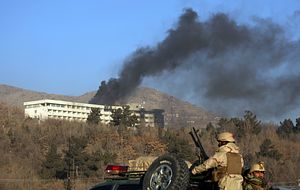As I sat in my Kabul office on the evening of January 20, 2018, the familiar — and unwelcome — sounds of gunfire began to increase in the background. A few minutes later, the guard at my residence informed me that the Intercontinental Hotel, a towering figure within sight of my rooftop, was under attack. The sound of bullets rained overnight and into the morning, by which time a thick mass of black smoke had taken over the north side of the hotel. All I could do was watch and pray for those inside. Having visited the site on countless occasions, I can’t possibly imagine what went through the minds of the guests trapped on the top floor, some of whom jumped off the balcony to their demise. Some 17 hours later, 40 lives had been lost.
In the days that followed, information emerged on the security lapses that allowed for the perimeter to be breached. Guests noted that upon entry, guards would conduct body searches but “didn’t check our luggage.” At the last of three checkposts, guards visually inspected bags because the scanner was broken. Several guards apparently fled their posts once the attack commenced. Three weeks prior to the attack, the hotel’s security was turned over to a little-known private company, Kabul Balkh Security and Safety Company, which has been criticized for the alleged inaction of its personnel. The company, in turn, has pointed fingers at the hotel staff for not addressing the various security problems that it had raised.
While it is important to identify the security lapses that led to this tragedy, such investigations fail to account for the structural issues in Afghan society that work against the interest of security. The continuous inflow of funds over the past 17 years — a large portion of which can be traced to U.S. patronage — has unfortunately done little for the flailing security of the country. During this period, strategic players have cleverly learned “how to play the game” and position themselves so as to extract the greatest benefits. The result has been the emergence of numerous powerful players — government officials, contractors, and the ominous “VIPs” — all of whom stand above the law.
Anyone familiar with Kabul is well aware of how money talks. Money helps adjust the rules when needed. It allows for individuals to trample the rights of others. Certain powerful individuals compete with one another for the most personal guards, as a symbol of status. When I’m driving through the city, it is normal to be accosted by a barrage of jeeps filled with guards pointing their guns at cars, signalling them to move away as they are escorting a “VIP.” While occasionally annoying, such events have become routine.
The Orwellian phrase that in some societies “All men are equal but some are more equal than others” holds a bitter truth in Afghanistan. On the lower echelons of the food chain are security personnel. It is not unusual for a guard to earn a meager $200 monthly. One such guard and personal friend has been collecting $1,000 to help his ailing mother get medical treatment in Pakistan. With such financial strains on their mind, few guards have incentive to deviate from general, expected norms.
The emergence of powerful players has significant implications for security. In Afghanistan, lying in the shadow of written rules are the actual rules that apply on the ground. Often, a guard must simply “know” whether or not it is inappropriate to check a person due to their status. A pat-down may very well be the cause of great offense and even a confrontation. It’s common for a guard to be given vague instructions: “Don’t check him. He’s a special guest.”
Security personnel must employ a combination of formal training and local know-how to figure out what rule applies in different situations. These assessments are an imprecise science, and when disaster strikes, fingers immediately point in their direction. Insurgents work to exploit these lapses by posing as important persons, thereby circumventing security measures.
After the attack on the Intercontinental Hotel, officials quickly condemned the incident and commenced the blame game. Ironically, some of the loudest voices came from those individuals whose very status “above the law” helps to create the security cracks through which insurgents operate.
Just as the attack on the hotel brought attention to the gaps in security protocol, it should also raise questions on the structural conditions in Afghan society that provide insurgents the opportunity to escape detection. A thorough security review must consider how funding streams and power structures create an environment where guards are disinclined to strictly enforce rules.
Nafay Choudhury is a residential research fellow at the Afghan Institute for Strategic Studies in Kabul and a PhD researcher in the Dickson Poon School of Law at King’s College London, where his research involves an ethnography of Afghanistan’s money exchangers.

































